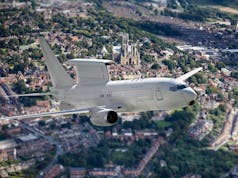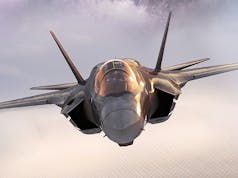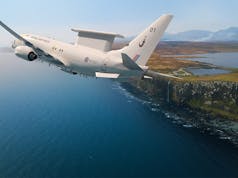Two British pilots have become the first in their services to fly the F-35 straight from training.
According to the MoD, Flight Lieutenant Liam and Lieutenant Chris became the first Royal Air Force and Royal Navy pilots respectively to proceed straight from flying training in a Hawk to fly the multi-role combat aircraft. All of the other pilots currently flying the F-35B have flown other fast jets prior to the F-35 after their training.
HMS Queen Elizabeth is expected to start fixed-wing flight trials with three or more F-35Bs off the eastern coast of the US around September this year. A fantastic info-graphic created by SaveTheRoyalNavy can be found here and details the timeline of the programme.
Speaking after his flight, Flt Lt Liam said:
“It was a sensational experience and, as the culmination of many years training, was certainly the highlight of my time in the RAF so far. I was astonished at the jet’s performance and at how well the simulator had prepared me for taking the Lightning flying. Much of the first flight is about exploring the aircraft’s performance envelope and breaking the sound barrier was a particular highlight. It is easy to see why every pilot here loves flying the aircraft and I am eager to press on and get stuck in to operating the Lightning and exploring it’s potential.”
Fellow pilot Lt Chris added:
“To fly a Lightning for the first time is almost indescribable. After over seven years of training in the Royal Navy, to finally get into the real aircraft and take it airborne was one of the proudest and most exciting experiences of my life so far. The computer systems, helmet display, and sensors are at the cutting edge of what is currently possible and I’m extremely excited to work on exploiting this potential as well as being part of its integration with HMS Queen Elizabeth and HMS Prince of Wales over the coming years.”
Commenting on the flights Air Commodore Linc Taylor, Senior Responsible Owner for the UK’s Lightning Programme, said:
“I am delighted that our first two ab initio pilots have flown Lightning and joined the rapidly expanding cadre of UK Lightning pilots. For any military pilot the first time you fly a front line aircraft is something you never forget, but to be the first to progress straight from training to fly F-35 is something to be especially proud of. I wish both pilots every success in their future careers and look forward seeing them both in the UK this summer when 617 Squadron returns to RAF Marham.”
According to a press release, the training of UK Lightning pilots is currently undertaken as part of a much larger UK Detachment at Marine Corps Air Station Beaufort, South Carolina. This ‘pooling’ arrangement with the United States Marine Corps (USMC) facilitates the high training rate necessary for building the essential numbers of personnel qualified and experienced to form the first operational UK squadron, No. 617 Squadron (the ‘Dambusters’) in 2018.













What are RAF pilots doing on an aircraft carrier. They should have no part in this. it is a naval platform and therefore only have naval pilots.
Dan-are you serious or tongue in cheek?
Could not agree more the RAF have always tried to sabotage the Navy carrier programmes.
The F-35 program seems to me proper grown up joint service cooperation. Other than ordering some more aircraft I think its exactly how the UK should proceed to optimise resources.
Interservice banter is not only fun when you are not on the receiving end of it but essential in keeping the competitive edge going the truth is neither could survive long without the other in a modern warfare environment cross-service training and deployment is perhaps not only a requirement in an underfunded tri-service but a great way of reminding us of United we stand Divided we fall.
Dave and Dan-the inter Services squabbles in the 60’s arguably did huge damage to the British military aircraft industry when the RAF and RN could not agree on reasonable joint requirements that would have streamlined aircraft needs and effected big savings that would have made several projects more viable-I think in particular of the P1154. Harold Wilson devastated the British Aircraft Industry when he cancelled this and other projects-notably TSR2, but inter Service rivalry played a big part in the whole sorry process. The whole F 35B programme for the UK Armed Forces is based around RN/RAF interoperability and co-operation. We can no longer afford the RN and RAF boxing matches
One of the factors in choosing the B version of the F35 was that it could more readily be operated by both services without extra specialist training.
Exactly and whilst critics focus on the shorter range and lower payload of the B version they forget that a huge plus both on land and at sea is the VSTOL capability especially in an emergency
VSTOL is the right call for me – we have a history of setting up ad hoc operations that are hard to hit as they are constantly moving.
yes this does give some restrictions in other areas, but overall I think its a good decision.
I have said this before – but I think the F35 will end up managing a fleet of UCAV’s onto target and doing all the jamming etc, and I also think the fuel and other limitations can be easily resolved with the right budget and strategy.
If the RN has control over these aircraft then it should not be a problem. We do not want to be in the situation where the RAF get rid of aircraft because of other priorities within the RAF, eg paying off the harriers. The RAF and RN have to different modus operandi. This will create problems which would not occur if they had their own fleet of aircraft.
I actually think the RAF should be absorbed and aligned into the other two services fully, as they essentially support these services.
I do not mean to underestimate their value -but think the whole force structure needs aligned around the CBG’s and our core defence requirements.
If we accept that our CBG’s are our offensive force and that all other forces are defensive (expeditionary and task led) then it becomes clearer that ultimately 2 carrier/expeditionary groups and 4 defensive groups are sufficient to meet our requirements as they currently stand.
We would have a large centralised command and support structure to support all these standalone groups and have a single command corps.
Time for a change – the infighting is still going on to devastating effect and we need to get a grip I am afraid.